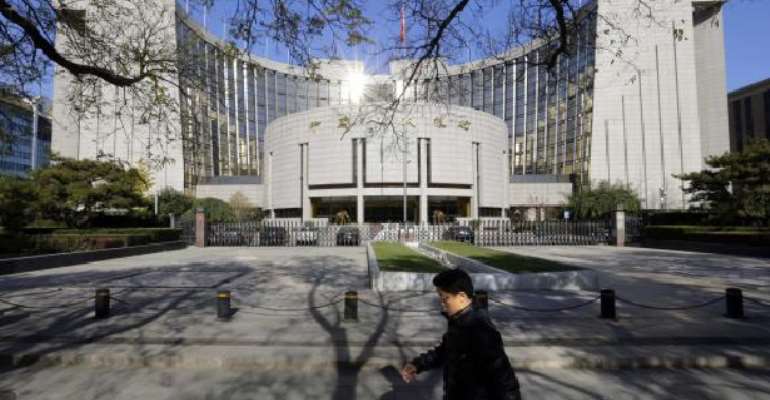China Central Bank Offers Emergency Funds To Small Banks As Rates Rise: Sources

China's central bank is offering emergency funding support to commercial banks amid a spike in cash rates, sources with direct knowledge of the move told Reuters on Monday.
The People's Bank of China (PBOC) will offer up to 120 billion yuan ($19.
8 billion) in 1-14 day funds to smaller banks via its Standing Lending Facility (SLF), the three sources said.
The move by PBOC comes after the interest rate that banks charge each other for short-term loans spiked in recent days.
Traders attributed the higher rates to elevated cash demand in the run-up to the Chinese Lunar New Year holiday, which begins on January 31.
The sources said banks incorporated at the regional or local level can apply to the PBOC for fund injections when the interest rate on the overnight bond repurchase rate exceeds 5 percent, the seven-day repo rate exceeds 7 percent, or the 14-day repo rate exceeds 8 percent.
The overnight rate closed at 4.
30 percent on a weighted-average basis on Monday but individual trades occurred as high as 9 percent.
The seven- and 14-day rates peaked on Monday at 10 percent and 7.
8 percent, respectively, according to data from the National Interbank Funding Center.
The central bank typically uses its SLF to provide one- to three-month loans to commercial banks.
In this case, however, the cash injections will range from one to 14 days.
The PBOC typically provides this type of short-term cash via reverse repos at its twice-weekly open market operations.
But the central bank has skipped open market operations for the last three weeks.
The relaunch of initial public offerings of stock is also boosting cash demand this week.
IPOs, restarted last week after a 14-month freeze, drive demand for short-term funding as investors need to deposit funds with underwriters in order to subscribe to new listings.
Eight companies said on Monday that they would list on the Shenzhen Stock Exchange on Tuesday, the first listings on China's smaller bourse since the freeze ended.
Traders had previously predicted funding conditions would tighten in late January.
The latest funding squeeze follows severe cash crunches in late June and late December.
The seven-day rate peaked at 28 percent on June 20, the highest trade on record, and soared again to 10 percent on December 20 and 23.
Bankers and analysts say the PBOC is attempting to strike a balance by guiding interbank interest rates higher without provoking a severe credit crunch that would spark panic.
Bankers say the central bank is using higher money market rates as a tool to curb the explosive growth in economy-wide debt since 2008, especially off-balance sheet debt that is often funded through interbank borrowing.
The PBOC and the banking regulator have repeatedly urged banks to improve liquidity management and reduce reliance on short-term funding markets.
Analysts say smaller banks rely the most on money-market funding because their smaller branch networks provide them less access to customer deposits.
Following the December cash crunch, the central bank pledged to improve communication with the market, after some bankers criticized authorities for appearing to stand passive as panic gripped the market and rumors swirled about interbank defaults.
REUTERS
